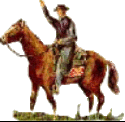BLACK HARRY
The Servant of our Lord Jesus Christ and Bishop Asbury
By Pastor Dennis Hartman
Written November 24, 1981 - Published to web Dec. 12, 2007
America has had the unfortunate blessing of having slavery in our early history. From the
time of its inception in the Virginia colony, blacks were looked upon as being below the whites
and inferior to them. Law also seemed to yield little protection or priviledges to this race.
Christianity also played a role with respect to slavery, particularly in the Antebellum period. In a
very particular way, slaves adopted their masters religion which also give them a cultural heritage
in this nation that seems to have been forgotten in the mind of the modern historian for politically
corrected view of the past. Among the main religious movements of that time was the Methodist
Episcopal Church. I would like to view some of their early writings and discover the Methodists'
views of and reactions to the exceptional black preacher nicked named Black Harry.
It seems from early reports that were logged by these early Methodist fathers that they had
a great interest in blacks as preachers. Among one of the leading blacks that were mentioned was
"Black Harry." Interestingly enough, his name was recorded as "Harry Hosier.""1"
Bishop Coke, the first Methodist bishop had this to say about Black Harry, "I really
believe he is one of the best preachers in the world, there is such an amazing power attends his
preaching, though he cannot read; and he is one of the humblest creatures I ever saw."2"
Still another preacher, Freeborn Garrettson, used Harry rather extensively on a preaching
tour through Connecticut and Massachusetts on his way to Boston. Garrettson showed his
fondness for Harry by allowing him to preach and giving him limited authority over services
while he visited elsewhere. Here are some quotes from Garrettson's Journal. "Harry exhorted
after me to the admiration of the people."3"" The people of this circuit are amazingly fond of
hearing Harry.""4" Harry exhorted after me with much freedom."5" I left Harry to preach another
sermon and went on to the center of the town."6" “At six Harry preached in the meeting house to
more than one thousand people."7" Interestingly enough, Garrettson only preached to about five
hundred the night before in the same church. "I have never seen so tender a meeting in this town
before, for a general weeping ran through the assembly, especially while Harry gave an
exhortation."8" At one point he rested and sent Harry to supply my afternoon's appointment:"9"
Finally, when Freeborn Garrettson came to Hudson he found "the people very curious to hear
Harry." He continues, "I therefore declined preaching that their curiosity might be satisfied." He
also notes some of the reaction by "different denominations" that "heard him had much
admiration, and the Quakers* bless their hears "thought that he was unlearned he must preach by
immediate inspiration."10" However, it is some what strange that Harry is not mentioned from this
point in his Journal.
According Dr. Abel Stevens, in his History of Methodism, Black Harry was "Harry
Hosier."11" He also devotes time to Black Harry by giving a brief sketch of his life. Stevens also
noted that Harry was preferred by many above Bishops Asbury and Coke and Whatcoat, for his
preaching. Stevens notes that he died in 1810 near Philadelphia.
To show how much the people preferred Harry to the Bishops he tells this episode.
On one occassion, in Wilimington, Delaware, where Methodism was long unpopular,
a number of the citizens, who did not ordinarily attend Methodist preaching came
together to hear Bishop Asbury. Old Asbury Chapel was, at
that time, so full that they could not get in. They stood outside to hear
the Bishop, as they supposed, but in reality they heard Harry. Before they
left the place, they complimented the speaker by saying:'If all Methodist
preachers could preach like the bishop we should like to be constant hearers.'
Some one present replied, 'That was not the bishop but the bishop's servant."
That only raised the bishop higher in their estimation; as their conclusion was,
'if such be the servant, what must the master be?' The truth was, that Harry
was a more popular speaker than Asbury, or almost anyone else in his day."12""
Harry later gave way to alcohol. This, however, was only for a brief time. He repented of
his deed and was restored to his place of preaching. He died a servant to Bishop Asbury, who
allowed Harry all the freedoms of a circuit preacher. Later Richard Allan, founder of the first
Black Methodist Church, would continue the Black impact on Methodism. Nathan Bangs, Abel
Stevens, Bishops Coke and Asbury, and Freeborn Garrettson, the voices of early Methodism as
well as its adherers seemed to hold Black Harry in great esteem.
Oh to God that we had black preachers like Black Harry. In spite of his brief lapse into
alcoholism, of which he repented, he knew and love His Lord Jesus Christ.
FOOTNOTES
1. Thomas Coke Apostle of Methodism , John Vickers
2. Ibid
3. Freeborn Garrettson, Nathan Bangs
4. Ibid, p. 211
5. Ibid, p. 212
6. Ibid, p. 215
7. Ibid, p. 216
8. Ibid, p. 217
9. Ibid, p. 218
10. Ibid, p. 220
11. History of the Methodist Episcopal Church, Abel Stevens p. 174
12. Ibid p. 175
BIBLIOGRAPHY
Thomas Coke: Apostle of Methodism, By John Vickers, Abingbon Press, Nashville Tenn. 1969
Rev. Freeborn Garrettson - Journals, By Nat an Bangs J. Emory and B. Waugh, New York, 1830
A History of the Methodist Episcopal Church. By Nathan Bangs, T. Mason and G. Lane, New
York, 1840
History of the Methodist Episcopal Church, By Abel Stevens Carton & Porter, New York, 1867
 |